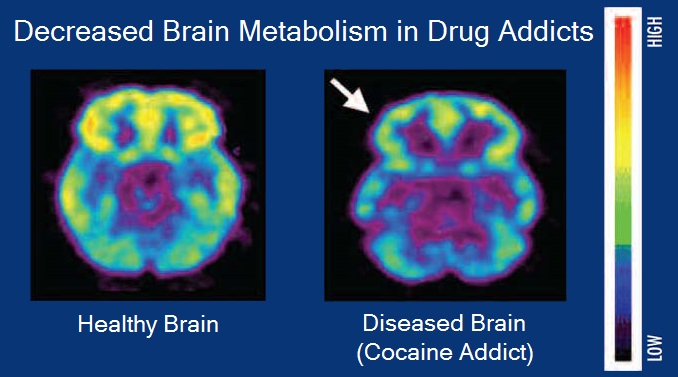Drug addiction encompasses all aspects of an individual, such as, his social, financial, mental, moral and physical well-being. The physical sensations and dependency recognized by the brain, however, are what compel a person to keep taking in the addictive substance until such time that he or she is rehabilitated.
The continued use of these drugs would destroy, not only the person’s physical health, but would also ruin his financial status, damage his mental and cognitive abilities, and affect his moral and social life.

The role of the Central Nervous System (CNS)
Before one can truly understand the physical basis of drug addiction, one should know first that almost all physical activities are initiated by the CNS through the voluntary or involuntary muscles of the body.
The brain (hypothalamus) is the center of the CNS, and is responsible in affecting physical activities through the stimuli that it receives from the different parts of the body.
When a person is into drugs, his brain’s function is affected, and he could not think clearly or decide correctly. The stimuli coming from the physical body would also make the person crave for that addictive substance.
Drugs create physical and psychological dependence
The second vital fact is that drugs, whether they are legal or not, generally create physical and psychological dependence. These two are what cause a person to continue taking the drugs even with the knowledge that they are harmful to his health.
The side effects could be a false sense of elation, euphoria, alertness, and other physical sensations, which would bring temporary relief or happiness to him.
The momentary high that the drugs produce in the body (physical) would then cause physical and psychological dependence. The drug addict craves for these sensations, and he has to take in the drug/s again to experience them. This goes on and on, and as he becomes desensitized to the drugs, the person increases his dosage as his body continues to crave for more.
Longing for physical sensations causes continued use
The physical sensations of euphoria and the like, is the physical basis of drug addiction because the person will continue with his unhealthy habit for as long as he can, in any manner that he can.
That is why drug addiction is considered a complex disease. People need treatment once physical dependence sets in, and people around them should understand this fact so that they would be able to help these persons with drug addiction.
People, who are into drugs, no longer have full control of their mental faculties. They are slaves to their physical need for the drug and they could not help it.
Someone must take charge and treat their disease promptly before it is too late. Drug addicts are sick persons. Successful treatment could only be introduced when the person is brought to a rehabilitation center, so that a program could be specifically created for him.







